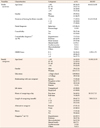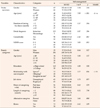Abstract
Purpose
The purpose of this study was to identify factors associated with family caregivers' self-management of acute stroke survivors.
Methods
The study participants were 130 stroke survivors and their caregivers. Data on participant characteristics, depression, task difficulty, survivor memory and behavioral problem, and self-management were collected from July 1 to September 30, 2017 using a structured questionnaire. Data were analyzed with the SPSS/WIN 23.0 program for descriptive statistics, using independent t-test, one-way analysis of variance, Pearson's correlation coefficient and enter multiple regression analysis.
Results
Significant factors associated with self-management for family caregivers were survivors' age, the presence of comorbidities, the relationship between caregivers and survivors, and the presence of an alternative caregiver. Self-management has negative correlations with depression, task difficulty, and the occurrence of survivor memory and behavioral problems. The determining factors affecting caregiver self-management were caregiver depression (β=−.46, p<.001) and survivor age (β=.32, p=.004), and their explanation power was about 37%.
Conclusion
The results suggest that caregiver depression and survivor age should be considered in developing the nursing interventions to improve family caregiver self-management. Furthermore, findings underscore the importance of early screening and ongoing psychological assessments for depression in family caregivers of stroke survivors.
Figures and Tables
Table 2
Degree of Depression, Task Difficulty, Perception of Survivors Memory and Behavioral Problems and Caregivers Self-management (N=130)

ACKNOWLEDGEMENT
This article is a revision of the first author's master's thesis from Gyeongsang National University.
References
1. Korean Stroke Society. Stroke. 2nd ed. Seoul: PanMun Education;2015.
2. Korean Statistical Information Service (KOSIS). 2016 Korea national health and nutrition examination survey [Internet]. Seoul: Statistics Korea;2017. cited 2018 August 25. Available from: http://kosis.kr/statHtml/statHtml.do?orgId=117&tblId=DT_11702_N111&conn_path=I2.
3. Denham AM, Baker AL, Spratt N, Guillaumier A, Wynne O, Turner A, et al. The unmet needs of informal carers of stroke survivors: a protocol for a systematic review of quantitative and qualitative studies. BMJ Open. 2018; 8(1):e019571. DOI: 10.1136/bmjopen-2017-019571.

4. Kim SH, Lee HJ. Factors affecting the outcome indicators in patients with stroke. Health Policy Manag. 2015; 25(1):31–39. DOI: 10.4332/KJHPA.2015.25.1.31.

5. Kim I. Sources of anxiety and burden of family caregivers of stroke patients: the role of self-efficacy and knowledge about care. Korean J Adult Nurs. 2012; 24(1):1–10. DOI: 10.7475/kjan.2012.24.1.1.

6. Gonzalez C, Bakas T. Factors associated with stroke survivor behaviors as identified by family caregivers. Rehabilitation Nursing. 2013; 38(4):202–211. DOI: 10.1002/rnj.85.

7. Jaracz K, Grabowska-Fudala B, Gorna K, Wojciech K. Caregiving burden and its determinants in Polish caregivers of stroke survivors. Archives of Medical Science. 2014; 10(5):941–950. DOI: 10.5114/aoms.2014.46214.

8. Kim KS, Han SS. Affecting factors on the quality of life of family care-givers caring for the patients with cerebral infarction. Korean J Health Promot. 2005; 5(2):64–72.
9. Ejem DB, Drentea P, Clay OJ. The effects of caregiver emotional stress on the depressive symptomatology of the care recipient. Aging Ment Health. 2015; 19(1):55–62. DOI: 10.1080/13607863.2014.915919.

10. Lee J, Yong JS. Spirituality and quality of life model of family caregivers caring for patients with stroke: path analysis. Korean Journal of Adult Nursing. 2016; 28(6):619–627. DOI: 10.7475/kjan.2016.28.6.619.

11. Cheon GI, Kim YS, Seo GH. Family caregiver's stress and physical health with demented patients using day care center. Korean J Stress Res. 2008; 16(4):401–408.
12. Kim TH, Park SH. The Effects of internalizing behavior problems of patients with dementia in predicting family caregivers' burden, depressive and physical symptoms. Korean J Health Psychol. 2016; 21(1):65–89. DOI: 10.17315/kjhp.2016.21.1.004.
13. Mochari-Greenberger H, Mosca L. Caregiver burden and nonachievement of healthy lifestyle behaviors among family caregivers of cardiovascular disease patients. American Journal of Health Promotion. 2012; 27(2):84–89. DOI: 10.4278/ajhp.110606-QUAN-241.

14. Menon B, Salini P, Habeeba K, Conjeevaram J, Munisusmitha K. Female caregivers and stroke severity determines caregiver stress in stroke patients. Annals of Indian Academy of Neurology. 2017; 20(4):418–424. DOI: 10.4103/aian.aian_203_17.

15. Satink T, Cup EH, de Swart BJ, Nijhuis-van der Sanden MW. The perspectives of spouses of stroke survivors on self-management-a focus group study. Disability and Rehabilitation. 2018; 40(2):176–184. DOI: 10.1080/09638288.2016.1247920.
16. Silva AL, Teixeira HJ, Teixeira MJC, Freitas S. The needs of informal caregivers of elderly people living at home: an integrative review. Scandinavian Journal of Caring Sciences. 2013; 27(4):792–803. DOI: 10.1111/scs.12019.

17. Kim IS, Yang SH. A Study on the burden and coping behaviors of stroke patients' family members. J Korean Clin Nurs Res. 2004; 10(1):28–41.
18. Spitzer RL, Kroenke K, Williams JB. Validation and utility of a self-report version of Prime-Md: the PHQ primary care study. JAMA. 1999; 282(18):1737–1744. DOI: 10.1001/jama.282.18.1737.
19. Han C, Jo SA, Kwak JH, Pae CU, Steffens D, Jo I, et al. Validation of the Patient Health Questionnaire-9 Korean version in the elderly population: the Ansan Geriatric Study. Comprehensive Psychiatry. 2008; 49(2):218–223. DOI: 10.1016/j.comppsych.2007.08.006.

20. Shim IB, Joe SH, Ham BJ, Han C, Jeong HG, Ko YH. The stress perception, depressive symptoms and medical comorbidity in healthcare center. Korean J Psychosom Med. 2013; 21(1):27–43.
21. Oberst MT, Hughes SH, Chang AS, McCubbin MA. Self-care burden, stress appraisal, and mood among persons receiving radiotherapy. Cancer Nursing. 1991; 14(2):71–78. DOI: 10.1097/00002820-199104000-00002.

22. Waltz C, Strickland OL, Lenz E. Measurement in nursing and health research. 4th ed. New York, NY: Springer Publishing Company;2010. p. 453.
23. Bakas T, Austin JK, Jessup SL, Williams LS, Oberst MT. Time and difficulty of tasks provided by family caregivers of stroke survivors. Journal of Neuroscience Nursing. 2004; 36(2):95–106. DOI: 10.1097/01376517-200404000-00007.

24. Lee MH, Yoon EK. A cross-validation of the Korean version of the revised Memory and Behavioral Problems Checklist (KRMBPC): exploratory and confirmatory analyses. Korean J Soc Welf. 2007; 59(2):65–88. DOI: 10.20970/kasw.2007.59.2.003.
25. Walker SN, Sechrist KR, Pender NJ. The health-promoting lifestyle profile: development and psychometric characteristics. Nursing Research. 1987; 36(2):76–81. DOI: 10.1097/00006199-198703000-00002.
26. Seo HM. Constructing of health promoting behaviors model in elderly [doctoral dissertation]. Seoul: Seoul National University;2000. 54–55.
27. Quinn K, Murray C, Malone C. Spousal experiences of coping with and adapting to caregiving for a partner who has a stroke: a meta-synthesis of qualitative research. Disability and Rehabilitation. 2014; 36(3):185–198. DOI: 10.3109/09638288.2013.783630.

28. McLennon SM, Bakas T, Jessup NM, Habermann B, Weaver MT. Task difficulty and life changes among stroke family caregivers: relationship to depressive symptoms. Archives of Physical Medicine and Rehabilitation. 2014; 95(12):2484–2490. DOI: 10.1016/j.apmr.2014.04.028.

29. Cheng HY, Chair SY, Chau JPC. Effectiveness of strength-oriented psychoeducation on caregiving competence, problem-solving abilities, psychosocial outcomes and physical health among family caregiver of stroke survivors: a randomised controlled trial. International Journal of Nursing Studies. 2018; 87:84–93. DOI: 10.1016/j.ijnurstu.2018.07.005.
30. Koyanagi A, DeVylder JE, Stubbs B, Carvalho AF, Veronese N, Haro JM, et al. Depression, sleep problems, and perceived stress among informal caregivers in 58 low-, middle-, and high-income countries: a cross-sectional analysis of community-based surveys. Journal of Psychiatric Research. 2018; 96:115–123. DOI: 10.1016/j.jpsychires.2017.10.001.

31. Choi HK, Kim JE. The effects of self-care activities on the physical and mental health of primary caregivers of functionally impaired elderly. Korean J Fam Soc Work. 2017; 55(0):157–187.
32. Kratz AL, Sander AM, Brickell TA, Lange RT, Carlozzi NE. Traumatic brain injury caregivers: a qualitative analysis of spouse and parent perspectives on quality of life. Neuropsychological Rehabilitation. 2017; 27(1):16–37. DOI: 10.1080/09602011.2015.1051056.

33. Honea NJ. Influences of self-care in the context of caregiving for a spouse with a brain tumor: a theoretical model [dissertation]. Salt Lake City, Utah: University of Utah;2012. p. 115–117.
34. Creasy KR, Lutz BJ, Young ME, Stacciarini JMR. Clinical implications of family-centered care in stroke rehabilitation. Rehabilitation Nursing. 2015; 40(6):349–359. DOI: 10.1002/rnj.188.





 PDF
PDF ePub
ePub Citation
Citation Print
Print







 XML Download
XML Download